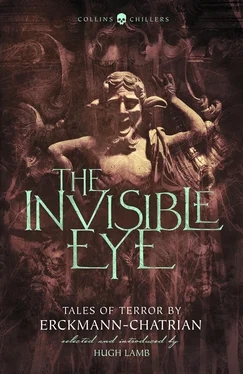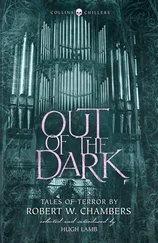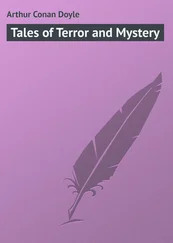The magistrate and the doctor of Hirchwiller drew up a formal report of the catastrophe. The unknown man was buried and all was settled.
Now about three weeks after these events, I went to see my cousin Pétrus Mauerer. I am his closest relative and, consequently, his heir. This circumstance maintains an intimate relationship between us. We were dining together, chatting of this and that, when the burgomaster told me the little story as I have just related it.
‘It’s strange, cousin,’ I said to him, ‘really strange. And you have no other information on this unknown man?’
‘None.’
‘Have you found anything that could put you on the track of his intentions?’
‘Absolutely nothing, Christian.’
‘But after all, what could he have been doing in the chamber? What was he living on?’
The burgomaster shrugged his shoulders, filled our glasses, and answered me: ‘Your health, cousin.’
‘And yours.’
We remained silent for some moments. It was impossible for me to accept the sudden end of the adventure. In spite of myself I gloomily pondered over the sad fate of certain men who appear and disappear in this world, like the grass in the fields, without leaving the slightest memory or the slightest regret.
‘Cousin,’ I resumed, ‘how long would it take from here to the ruins of Geierstein?’
‘Twenty minutes at the most. Why?’
‘Because I would like to see them.’
‘You know that today we have a meeting of the town council and I cannot accompany you.’
‘Oh! I shall be able to find them on my own.’
‘No, the constable shall show you the way, he has nothing better to do.’ My dear cousin called his servant.
‘Katel, get Hans Goerner … make him hurry up … It’s two o’clock. I must go.’
The servant went out and the constable wasn’t long in coming. He received orders to guide me to the ruins.
While the burgomaster was making his way solemnly to the council chamber, we were already going up the hill. Hans Goerner pointed out the remains of the aqueduct. At this point the rocky ridges of the plateau, the bluish distances of the Hundsrück, the dismal dilapidated walls, covered in a dark ivy, the tolling of the bell of Hirchwiller, summoning the dignitaries to the meeting, the constable panting, clinging to the brushwood … took on in my eyes a sad, harsh hue. It was the story of this poor hanged man which stained the horizon.
The stairway to the chamber appeared very strange, its spiral elegant. The prickly bushes in the clefts of each step, the deserted appearance of the surroundings, all were in harmony with my sadness. We descended. Soon the bright point of the opening which seemed to grow narrower and narrower and to assume the form of a star with curved rays, alone sent us its pale light.
When we reached the bottom of the chamber what a superb view awaited us of those stairs lit up underneath, throwing their shadows with wonderful regularity. Then I heard the buzzing which Pétrus had told me about; the huge granite conch had as many echoes as stones!
‘Since the little man, has anyone come down here?’ I asked the constable.
‘No, sir. The peasants are afraid. They think that the hanged man will return.’
‘And you?’
‘Me, I’m not curious.’
‘But the magistrate … his duty was …’
‘Humph! What would he be doing in the “Owl’s Ear”?’
‘They call this the Owl’s Ear?’
‘Yes.’
‘It is almost that,’ I said, looking up. ‘This inverted vault forms the outer ear very well, the underneath part of the steps represents the drum, and the bends of the stairway the cochlea, the labyrinth and the opening of the ear. That then explains the murmuring that we can hear: we are at the bottom of a colossal ear.’
‘That is very possible,’ said Hans Goerner, who seemed to understand nothing of my observations.
We were on our way back up. I had already taken the first steps when I felt something snap beneath my foot. I bent down to see what it could be and I noticed at the same time a white object in front of me. It was a sheet of torn paper. As for the hard matter that had been pulverized, I recognized a sort of pot made of glazed stoneware.
‘Ho! Ho!’ I said to myself, ‘this will be able to throw some light on the burgomaster’s story for us.’
And I joined Hans Goerner, who was by now waiting for me at the kerb of the cistern.
‘Now, sir,’ he shouted to me, ‘where would you like to go?’
‘First of all let us sit down a little, we shall see presently.’
And I found a place on a large stone, while the constable let his hawk-like eyes gaze all around the village, to discover marauders in the gardens, if there were any.
I carefully examined the stoneware vessel, of which no more than a fragment remained. This fragment took the shape of a funnel, lined with down on the inside. It was impossible for me to make out its purpose. Next I read the piece of paper, which was written on in a very steady hand. I transcribe it here according to the text. It seems to be a continuation of another sheet, for which I have since searched in the vicinity of the ruin, but in vain.
My ‘microeartrumpet’ has therefore the double advantage of multiplying ad infinitum the intensity of sounds, and of being able to fit the ear, which in no way impedes the observer. You cannot imagine, my dear master, the charm that one feels on hearing these thousands of imperceptible sounds which, on fine summer days, blend into one mighty buzzing. The bee has his song like the nightingale, the wasp is the warbler of the mosses, the cicada is the lark of the tall grasses, in this the mite is the wren – it has only a sigh, but this sigh is melodious!
This discovery which, from the sentimental point of view, makes us live the life of universal nature, surpasses in its importance all that I could say about it.
After so many sufferings, privations, and worries how happy it is in the end to gather the rewards of our labours! With what leaps the soul rises up to the divine author of these microscopic worlds, whose splendour is revealed to us. What then are these long hours of anguish, hunger, scorn which overwhelmed us in the past? Nothing, sir, nothing! Tears of gratitude wet our eyes. One is proud to have bought through suffering new joys for humanity and to have contributed to its improvement. But however vast, however admirable are the first results of my ‘microeartrumpet’, its advantages are not limited to that alone. There are others more positive, more material in some respects, and which can be translated into figures.
Just as the telescope causes us to discover myriads of worlds, completing their harmonious revolutions in the infinite, so too my ‘microeartrumpet’ extends the sense of hearing beyond all the limits of possibility. Thus, sir, I shall not stop at the circulation of the blood and vital fluids in the living body; you hear them running with the impulsiveness of cataracts, you perceive them with a distinctness which terrifies you, the slightest irregularity in the pulse, the lightest obstacle strikes you and has on you the effect of a rock against which break the waves of a torrent.
It is undoubtedly a tremendous conquest for the development of our physiological and pathological knowledge, but it is not on this point that I insist.
By pressing your ear to the ground you hear the hot springs surging at immeasurable depths, you assess their volume, the currents, the obstacles.
Would you like to go any further? Enter an underground chamber sufficiently large to pick up a considerable quantity of sounds; then, at night, when all is asleep, when nothing disturbs the inner sounds of our globe, listen!
Sir, all that it is possible for me to tell you at present, because in the midst of my abject misery, my privations, and often my despair, I have only a few lucid moments left to gather together geological observations, all that I can assert for you is that the bubbling incandescent lava, the glow of boiling substances is something terrifying and sublime, and which can only be compared to the impression of the astronomer sounding the endless depths of the universe with his telescope.
Читать дальше












